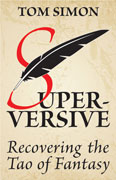The fourth essai in a series, following ‘Tyrion 13:4’. The original appeared on LiveJournal in May, 2006.
As I said earlier, the choice of an appropriate prose style for a fantasy tale is a decision fraught with peril. We are tempted to choose a style that will convey the proper sense of wonder and adventure, and the air of old times and alien cultures; or would, if we only had the skill to pull it off. If we lack that skill, our stories will sound rather like an untrained singer trying to do the lead in Rigoletto — ambitious, but inept. And this will get us laughed at.
It is safe to say that none of us enjoy being laughed at. So for perhaps forty years past, there has been a reaction in the opposite direction; and I am afraid that is an even worse error. The sensible reaction would be to learn how to produce the effects that we wanted; the real reaction, for far too many writers, has been simply to give up trying and settle for a bland quotidian style. Their stories are inept without being ambitious. And this is worse, for unless they are very lucky, it gets them ignored and forgotten. They may truly be hearing the horns of Elfland in their heads; but they cannot play that music. What they do play is a tuneless mishmash compounded of slovenly description, spin-doctoring, and rhetorical fog. [Read more…]








Recent Comments